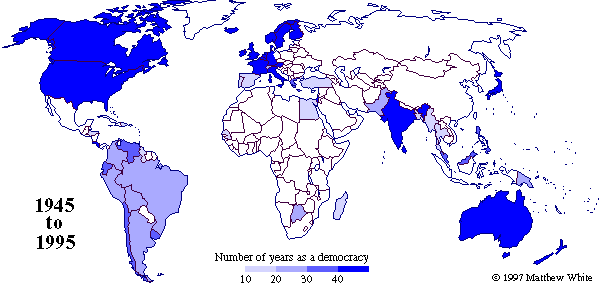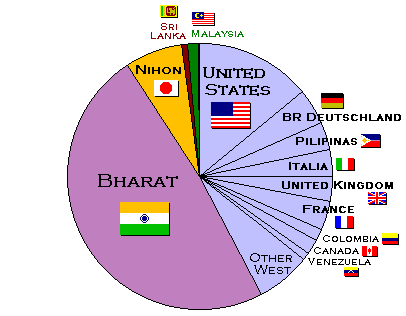

Although democracy has had a rough ride over the century, it's best to keep in mind that it has not been as rare, fragile or endangered as some commentators would have you believe:
Rare?
On average, at any given time during this century, 31% of the human population has been living in fully democratic nations. That means that one out of every three people has been able to speak his or her mind with reasonable safety, and attempt to guide his or her nation's policy without fear of legal retaliation. Sure, 31% is still a minority, but the way some people talk, they make the free nations of the world sound like band of nomads huddled around a campfire in the desert -- a lonely light in the vast night.
It's not that way at all.
Fragile?
Democracy has seen some notable failures. The fall of Weimer Germany to the Nazis is the mythic example, but there have been plenty of other democracies that fell to (more or less) homegrown tyranny: Italy in 1922, Brazil in 1964, Chile in 1973, India in 1975, Argentina in 1976. The problem with stringing out a list like this is that it's been a busy century. There has been a lot of turnover in regimes over the past hundred years, and you can easily find examples of any kind of transition you want.
Consider this instead: Nothing lasts forever, and almost every nation on the planet has seen at least one violent or unconstitutional change in leadership over the past hundred years. In fact, there are only a handful of countries that have had an unbroken chain of legitimacy since 1900 -- the United States, the United Kingdom, Sweden, Switzerland, probably Canada -- all democracies. In theory, it doesn't have to be this way. Monarchies, for example, are supposed to pass father to son, but none have survived the past hundred years without surrendering power to liberal parliaments. (The only absolute monarchies still around are younger than the 20th Century. [q.v.]) Single-party states are supposed to have orderly transitions of power, but here too, none have managed to go a full century without collapsing. Compared to all these failures, democracy looks a bit tougher.
Endangered?
The biggest enemy to democracy in the 20th Century has been Fascism, which was actually voted into power in both Germany and Italy according to strictly constitutional procedures. After dismantling those very same constitutions, the Fascists then invaded and conquered neighboring countries, many of whom were stable, peaceful democracies. Across the century, other more or less fascist regimes have replaced democracies time and again with military coups and declarations of national emergencies.
More problematic is the relationship between Communism and democracy because there isn't one. Communism has never been voted into office, nor has it overthrown a democracy which has been around longer than three years (Czechoslovakia, 1948). True, democracy has never flourished where Communism took hold, but the relationship is mostly a matter of smothering the growth of democracy, rather than replacing it where it stands. Historically, democratic regimes are immune to Communism.
Democracies Established:
Democracies Overthrown:
(Long-Term meaning those nations which spent more than 30 years as democracies during the period 1945-95).

No one really knows what causes democracy. Most scholars believe that the presence of a strong middle class has a lot to do with it, but unfortunately, that doesn't explain India. A minority believe that democracy and Christianity are linked, but that, too, fails to explain India. You might deny the significance of India, saying it's only one country. It is, however, a really big country. It accounts for almost half the people who have lived under democratic regimes throughout history. If India had broken up into its constituent states -- all remaining democratic -- while West Europe had united into one big federation, would we then dismiss Europe as "only one country"?
Quite often, commentators trying to explain why democracy survives or fails in some country will cite "democratic tradition", which sounds impressive but is rather tautological. If democracy only takes root in countries which have a "democratic tradition", how can a country acquire this tradition in the first place? In India's case, they were conquered by a democracy, but then, why didn't Nigeria or Ghana develop a strong democratic tradition? And where did Spain -- never conquered, passed around between kings and dictators -- get the tradition?
No, the search for a grand, unified theory of democracy continues.
Last updated August 1999
Copyright © 1999 Matthew White